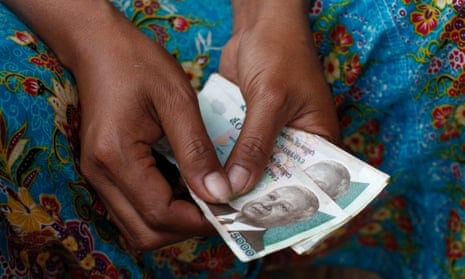Guest post for The Guardian’s Global Development Professionals Network.
What do most people immediately think of when you ask them why poor countries are poor? We’re pretty confident that it will be corruption.
Whether you ask thousands of people in a nationally representative survey, or small focus groups, corruption tops people’s explanations for the persistence of poverty. Indeed, 10 years of research into public perceptions of poverty suggests that corruption “is the only topic related to global poverty which the mass public seem happy to talk about”.
Which is odd, because it’s the absolute last thing that people actually working in development want to talk about. It’s as though we are stuck in some elaborate Basil Faulty parody: “Don’t mention [the war] corruption!”
Like it or not – and many do not – if development organisations are serious about winning the public argument on aid, then we need to address the spectre of corruption.
Some great work is being done around transparency and accountability – Integrity Action, Global Integrity, the Tax Justice Network, Transparency International, and ONE to name a few. But corruption is the perennial elephant in the room: there is a palpable reluctance by those working in development to engage with the public on the complexity of corruption in poor countries.
The public stereotype of corruption is the mass looting of government coffers by an African dictator and family to buy fast cars, fine wines, mansions, and Michael Jackson memorabilia. The day-to-day reality is far more complex and actually mundane. Corruption is often (an imperfect) solution to all sorts of problems that poor people face such as a lack of security or access to basic services. And it often involves the complicity of wealthy countries and misinvoicing by multinational companies. It is the poorest that lose.
A recent report by Bond on public support for development says corruption has become the sector’s taboo – the “c-word”. Why? The short answer: NGOs fear jeopardising support or appearing racist. No one wants to break ranks, and there is no incentive to take on the longer-term problem – this is not unreasonable.
Another fairly reasonable concern emerged from messaging research for the UK’s Department for International Development (DfID) in 2009. One of the chief conclusions was that talking to the public about corruption “can make the problem seem bigger than previously thought … [and] can also bring to mind other ‘difficult’ issues surrounding aid”.
These concerns chime with the work of the Berkeley cognitive linguist George Lakoff who emphasises the centrality of metaphor and mental structures, and suggests winning the argument is about re-framing debates rather than engaging head-on. One of his most famous examples is Nixon’s declaration: “I am not a crook.” Everyone immediately thought “crook”. Actively negating an issue will have the unintended consequence of evoking an issue. Even talking about tackling corruption evokes corruption. So just don’t mention it; it’s a plausible argument.
But it’s also dangerous. If the sector won’t talk about corruption then plenty of others will. One in four newspaper stories about developing countries are about tackling the issue. The simplistic and alarmist way in which the media report corruption overseas shows how risky it is to abdicate responsibility in the public debate surrounding it.
One of the six recommendations at the end of Bond’s report is that the sector needs to go “where the conversation is” and take care to craft different messages for different audiences. Not that we shouldn’t talk about it, but that we should take charge of reframing the debate.
Along with colleagues Heather Marquette and Caryn Peiffer, we have been carrying out research that has been trying to figure out where the public is on corruption and aid. This is where we are so far:
First, public attitudes in donor countries are largely pessimistic and negative – and attitudes are hardening. In 2008, when DfID asked whether people agreed or disagreed with the statement “Corruption in governments in poor countries makes it pointless donating money to help reduce poverty”, 48% of the population agreed. By 2010, 60% agreed and by 2014, 67% agreed.
Second, of those who agreed that “most aid to poor countries is wasted”, one in seven still supported government spending on overseas aid. Some people support aid despite losses, a phenomenon Roger Riddell called “The Gap”. We wondered whether a “venture capitalism” argument might work – aid is a risky investment, there will be some failures, but the successes outweigh the losses. But only one in three agreed. Only when we presented people with details of anti-corruption efforts did a majority support aid.
Third, to directly test whether talking about anti-corruption will actually damage support for aid, we gave four groups a different statement about poverty in Kenya. The first group’s statement did not mention corruption, the second one mentioned the levels of bribery in Kenya, the third gave information about a recent corruption scandal – the standard fare of media reporting – and the fourth group were told about anti-corruption and transparency efforts.
A question was put to all four groups: should we stop giving aid to Kenya? In the no-mention-of-corruption group around one in three people wanted to stop aid, this rose to one in two for the prevalence-of-bribery group, and was only a little higher in the corruption-scandal group. And guess what? The response of the fourth group, only told about anti-corruption efforts, was statistically indistinguishable from the no-mention-of-corruption group.
The lesson: if people hear about efforts made to tackle corruption, they are no more likely to oppose aid than if we don’t talk about corruption.
The implication: we can talk about corruption. What’s more, if others are talking about corruption, it’s better to engage than not engage. To be clear, leading with anti-corruption messaging is not going to win hearts and minds, but the sector must actively challenge the prevalent narrative that aid is akin to throwing money down a rat hole.
This is only one data point. There are lots of further questions, such as whether some use corruption as an excuse to justify other politically incorrect reasons to oppose aid. But we think it’s worth building on. More creative, interesting, and compelling narratives have to be built around how corruption works, its effects, and how to address it.
Development organisations are increasingly being asked to show that they give value for money and – like it or not – concerns about corruption are inevitably going to be part of that discussion.
We need an honest and grown up conversation about corruption in order to move the debate away from simplistic and moralistic frames.
Development organisations are increasingly being asked to show that they give value for money and – like it or not – concerns about corruption are inevitably going to be part of that discussion.










